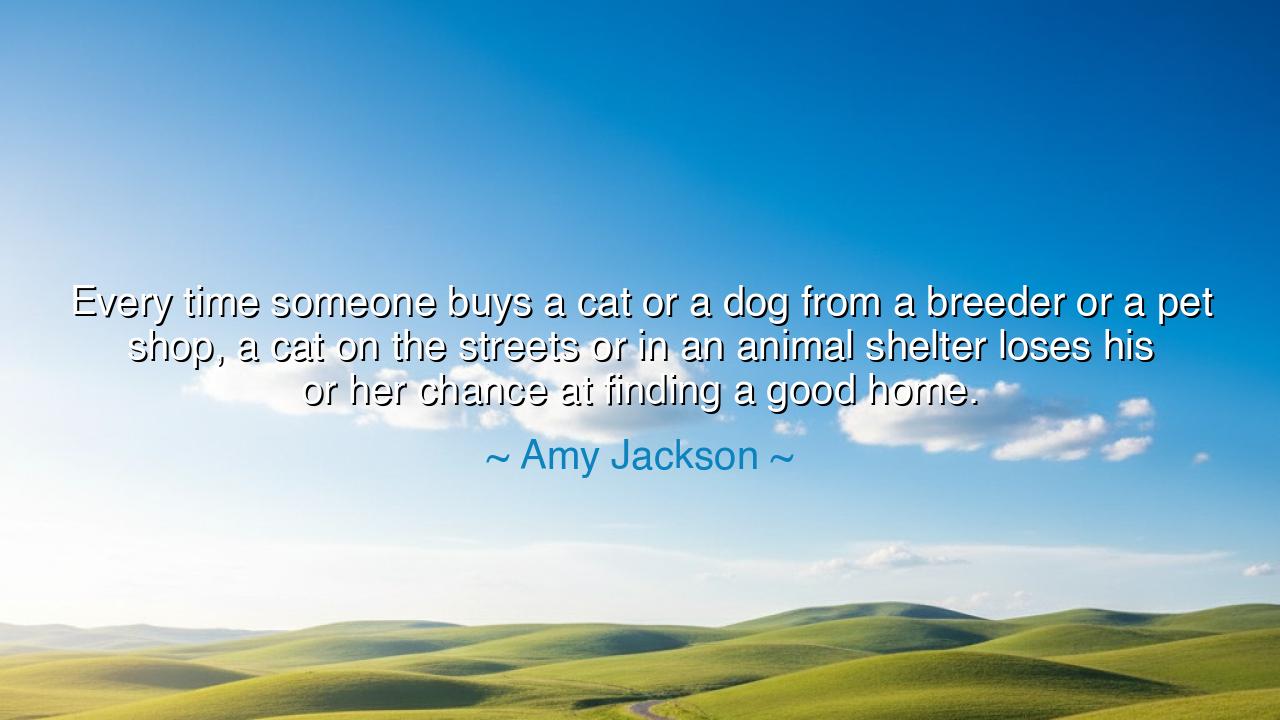
Every time someone buys a cat or a dog from a breeder or a pet
Every time someone buys a cat or a dog from a breeder or a pet shop, a cat on the streets or in an animal shelter loses his or her chance at finding a good home.






In the words of Amy Jackson: “Every time someone buys a cat or a dog from a breeder or a pet shop, a cat on the streets or in an animal shelter loses his or her chance at finding a good home.” These words carry not only compassion but also urgency. They are a call to conscience, reminding us that every choice we make ripples outward, shaping the fate of creatures who depend upon us. Jackson speaks not merely of pets but of the eternal bond between humanity and the animals entrusted to our care. Her warning is simple yet profound: choice matters, and mercy delayed is mercy denied.
The origin of this thought lies in the plight of abandoned animals—creatures who wander the streets hungry, frightened, and forgotten, or who wait silently behind the bars of shelters, hoping for kindness. When one chooses to buy from a breeder or a shop, another innocent life is passed over, left to languish in despair. Thus, the act of purchase is not neutral—it has consequences. To give a home to one already lost is to heal a wound in the world; to ignore them is to deepen that wound.
The ancients, too, understood this sacred duty. In the temples of Egypt, cats were revered as guardians, protectors of grain, and companions of households. To harm them was considered a crime against the divine order. In India, texts often spoke of compassion to animals as a measure of the soul’s purity. Even the Greeks, who raised dogs as hunters and guardians, honored their loyalty. Thus, across cultures, animals were never seen as mere objects of trade but as beings whose fate reflected the morality of their human companions. Jackson’s words echo this old truth: to neglect the vulnerable is to diminish ourselves.
Consider the story of Hachikō, the loyal dog of Japan, who waited for his deceased master every day at the train station until his own death. The people of Tokyo, moved by his devotion, built a statue in his honor, and his story became a symbol of fidelity and love. But how many animals like Hachikō languish unseen, never honored, their loyalty unrewarded, because they remain in cages or on the streets while humans seek “pedigree” or perfection from breeders? Jackson reminds us that greatness is not in pedigree but in compassion, not in bloodline but in love.
The meaning of this quote is thus heroic in its simplicity: when we choose to adopt, we save a life. When we choose otherwise, we deny that chance to one who waits. To open our homes is to open our hearts, to say to a creature abandoned by others, “You belong.” It is not merely kindness but justice, for these beings did not choose to be forsaken. Our choices, therefore, carry the weight of destiny—for them and for us.
The lesson is clear: let mercy guide your choices. If you seek a companion, do not look first to shops or breeders, but to shelters and to streets, where the forgotten wait. There you will find not only animals in need but opportunities for transformation—your own as well as theirs. To adopt is to participate in healing, to turn loss into hope, to make your home a sanctuary.
In practice, let your actions be deliberate. Visit shelters. Volunteer your time. Support organizations that rescue and care for the abandoned. Share the stories of adopted animals so others may be inspired to act likewise. And when you welcome an animal into your life, let it be not as an accessory or possession, but as a companion, equal in dignity, deserving of love. For in saving them, you too are saved—from indifference, from selfishness, from the poverty of a heart closed to compassion.
Thus Amy Jackson’s words endure as a teaching: every choice matters, every life matters. To buy is easy; to adopt is noble. Let us, therefore, be counted among those who lift up the forgotten, who open their doors to the lost, who write their names in the great ledger of mercy. For the measure of humanity is not in monuments or wealth, but in the tenderness we show to those who cannot speak, yet who love us all the same.






AAdministratorAdministrator
Welcome, honored guests. Please leave a comment, we will respond soon